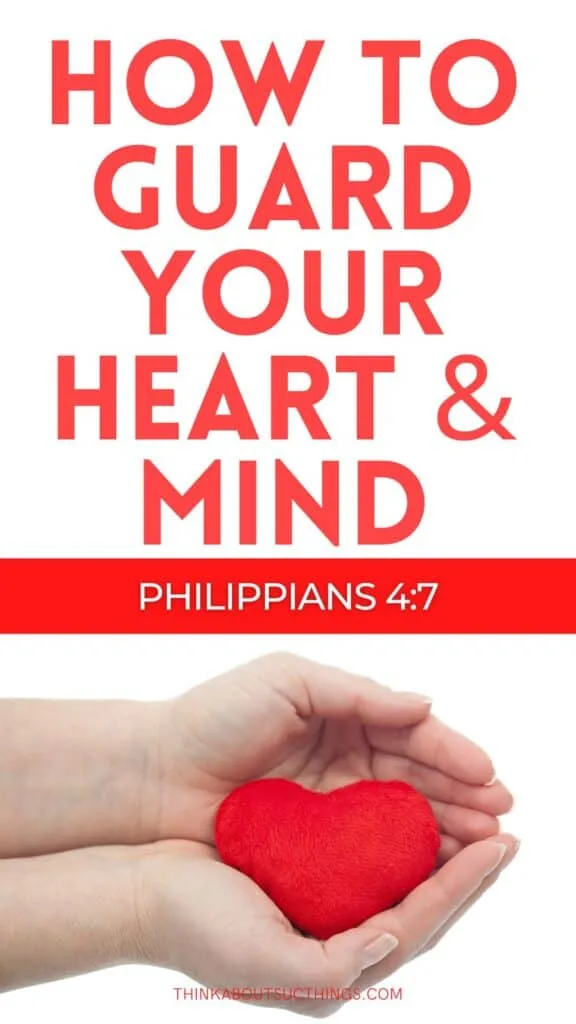In this article, we will explore the meaning of Philippians 4:7 and how we can learn how to guard your heart and mind. So, get your Bible, and let’s dive in…
In Philippians 4:7, Paul tells us that the peace of God will guard our hearts and minds in Christ Jesus. Most of us have probably read that scripture before and thought about how poetic it is, and beautiful it sounds. And because it’s part of Paul’s closing words in the letter to the Philippians, we often tend to overlook it somewhat.
We think that’s Paul’s way of closing his letter and saying bye.
Yet there are some vital things in that little verse that could help us as believers considerably, especially with the concerns and fears we face in the modern world.
So, what does God mean when He says to guard your heart and mind? Why should we be concerned with it, and how do we go about it?

Why Guard Your Heart
We should first consider the difference between the heart and the mind.
The Greek word translated as “heart” in this verse is “kardia.”
STRONG’S CONCORDANCE
2588. καρδία kardia, kar-dee´-ah; prolonged from a primary κάρ kar (Latin cor, “heart”); the heart, i.e. (figuratively) the thoughts or feelings (mind); also (by analogy) the middle: — (+ broken-)heart(-ed).
It literally refers to your physical heart, the organ that pumps blood through your veins, and it’s also where we get the English words “cardiac” and “cardio” from.
But there’s more to it. The Bible hardly ever uses the word kardia to refer to the organ, and in most cases, it’s meant with one of the following symbolic interpretations:
- The center of our physical and spiritual life
- Our thoughts and feelings
Let’s look at verse 7 within the context of the verses around it:
“Do not be anxious about anything, but in everything with prayer and supplication with thanksgiving let your requests be made known to God. And the peace of God, which surpasses all understanding, will guard your hearts and minds in Christ Jesus.
Finally, brothers, whatever is true, whatever is honorable, whatever is just, whatever is pure, whatever is lovely, whatever is commendable, if there is any excellence, if there is anything worthy of praise, think about these things. What you have learned and received and heard and seen in me – practice these things, and the God of peace will be with you” – Philippians 4:6-9
Paul wrote the letter to the Philippian’s close to the end of his life, and scholars believe it might have been Paul’s final epistle.
He was imprisoned in Rome at the time and reached out to one of the congregations he had planted.
At that time, the church was being prosecuted as it had never been before. Being a Christian was considered a crime in itself; you didn’t even have to do anything illegal to be charged and often brutally killed.
That was when Paul wrote to the Philippians to guard their hearts and minds. It makes you look at those words a little differently…doesn’t it?
It’s safe to assume that many Christians got discouraged and scared during this period, especially when they heard that Paul was arrested and would likely be executed.
In this context, Paul told them to guard their hearts – the core of their spiritual lives, thoughts, and feelings.
This is just as important today as it was 2000 years ago. When we look at the world around us, it’s easy to feel despondent, especially if you read or watch the news.
Sin abounds and is even praised in the courtrooms (and some churches). Many consider Christians to be religious nuts and a danger to society. The global economy is leaving many believers impoverished and hopeless. These are trying times, saints!
Yet Paul is telling us not to let that affect our thoughts and feelings. That might sound nearly impossible, but God’s grace, love, and presence make it possible! More on that in a moment.
Why Guard Your Mind
The word translated as “mind” is the Greek word “noema.”
νόημα noema, no´-ay-mah; from 3539; a perception, i.e. purpose, or (by implication) the intellect, disposition, itself: — device, mind, thought.
It has a few meanings:
- Perception
- Purpose
- Intellect
- Disposition
- Mind
- Thought
The primary difference between noema and the symbolic interpretation of kardia is that kardia deals with emotional thought, while noema is more about logical thinking.
You could say kardia refers to our emotions, while noema refers to our actual thoughts and reasoning.
| Heart – Kardia | Mind – Noema |
|---|---|
| Emotions | Logic |
| Feelings | Resoning |
As often happens in all forms of science, psychology eventually caught up and learned what the Bible has been saying in many ways for millennia.
Psychologists refer to it as the CBT Model (Cognitive Behavioral Therapy):
- Our thoughts (noema) create our emotions (kardia).
- Our emotions (kardia) affect our actions.
- Our actions directly determine our outcomes.
- The outcomes reinforce our thoughts (noema).
We are all stuck in this cycle, for better or worse, and will keep repeating unless we break it. The only way to break it is by changing our thoughts since that is where it all starts.
By guarding our minds, we can change our emotions, which will change our actions, which will improve our outcomes.
James 1:14-15 explains this process very well; the temptation (thought, in your mind), then the lust and enticement (emotions or “heart”), followed by sin (action), leading to death (outcome).
But each one is tempted when he is drawn away by his own desires and enticed. 15 Then, when desire has conceived, it gives birth to sin; and sin, when it is full-grown, brings forth death.
So, as we can see, guarding your heart begins with guarding your mind.
Practical Ways to Guard Your Heart And Mind
The Bible gives us some very clear ways to guard our hearts and minds.

Stop The Anxiety
The Bible tells us in Philippians 4:6 not to be anxious about anything at all. Yes, that sounds like a tall order, but it’s not a request – it’s an instruction.
It doesn’t leave room for discussion, either; the word “anything” means that if we are anxious about even one little thing, we are not obeying the instruction.
Being anxious is a sign of not trusting God.
It takes practice, but the Holy Spirit will help us when we ask Him to. As we can see in the verse, it involves making your requests known to God by prayer and supplication, with thanksgiving. It’s about thanking God for taking care of our requests by faith, even if we do not see the results yet.
Think About Such Things
This is the part that is dear to me as it is where I got the name for my site. Philippians 4:8 tells us to think about particular things. Whenever a thought occurs to you, check it according to the list: Is it…
- true
- noble
- just
- pure
- lovely
- good report
- virtue
- praiseworthy
Those are not just nice words. They are to help us know where our thought life should be focused on. If what you are thinking doesn’t fall into those categories, then reject the thought. It is not of God, and entertaining the idea a moment longer is not guarding your heart and mind.
Take Every Thought Captive
In 2 Corinthians 10:5, Paul says,
“We destroy arguments and every lofty opinion raised against the knowledge of God, and take every thought captive to obey Christ, being ready to punish every disobedience, when your obedience is complete.”
When we know what God says about a matter, every thought we have should be in line with that truth.
Nothing the world says or does should change or influence how we think about the issue because God’s Word is final, and no commentary from the world or the enemy will be considered.
Force your thoughts to obey Christ. It’s a matter of developing habits to analyze every thought and willfully reject those not in line with God’s Word.
Renewal Of The Mind
Romans 12:2 says…
“Do not be conformed to this world, but be transformed by the renewal of your mind, that by testing you may discern what is the will of God; what is good and acceptable and perfect.”
The world will watch the news and be anxious. We are to look at the same broadcast and realize that all these things must happen but that it is not a surprise to God. That’s a matter of renewing your mind to the Word of God. But how do we do that?
It starts with what you allow into your mind. Joshua 1:8 says:
“This Book of the Law shall not depart from your mouth, but you shall meditate on it day and night, so that you may be careful to do according to all that is written in it. For then you will make your way prosperous, and then you will have good success.”
Your mind will always be full of what you allow to enter it. If you spend every day watching news broadcasts or reading about it on social media, your heart, and mind will be full of negative things.
If you obsess over the wrong things in your life, your joy will be stolen, and you will miss the blessing already there.
The only way to counteract that is by feeding your heart and mind with the Word of God. When the negative thoughts come, make sure that you have enough scripture in your mind to counter it immediately and to take it captive, just like Jesus did, by saying, “It is written.”
When we fail to guard our hearts and minds, it’s easy to excuse it because we are “only human.” But that should not be an excuse. Christ did not die for us to be “only human.” He died so that we could become new creations in this life. And how does this happen? Our spirits have been recreated, our bodies will be resurrected, but for now, the battle lies in our thoughts. Guard your heart and mind.

Melissa is a passionate minister, speaker and an ongoing learner of the Bible. She has been involved in church and vocational ministry for over 18 years. And is the founder of Think About Such Things. She has the heart to equip the saints by helping them get into the Word of God and fall more in love with Jesus. She also enjoys family, cooking, and reading.
She has spoken in churches in California, Oregon, Texas, and Mexico and has been featured in Guidepost Magazine and All Recipes Magazine. Read More…
